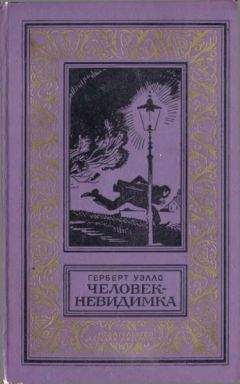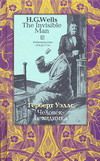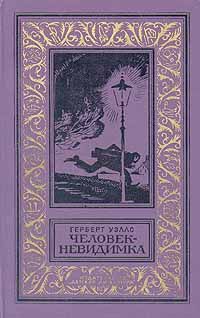H. Wells - Английский язык с Г. Уэллсом "Человек-невидимка"
“You brute, you (ах ты, тупая тварь; brute — жестокий, грубый или глупый человек; скотина)!” said Fearenside, climbing off the waggon with his whip in his hand (сказал Фиренсайд, слезая с повозки с кнутом в руке; to climb — карабкаться, взбираться; выбираться/изчего-либо/), while the dog watched him through the wheel (в то время как собака следила за ним через колесо = из-за колес). “Come here (иди сюда),” said Fearenside — “You’d better (тебе же лучше/не то хуже будет).”
execute [`eksIkjHt], trousering [`trauz(q)rIN], glove [glAv], uncarpeted [An`kRpItId]
They saw the dog’s teeth had slipped the hand, heard a kick, saw the dog execute a flanking jump and get home on the stranger’s leg, and heard the rip of his trousering. Then the finer end of Fearenside’s whip reached his property, and the dog, yelping with dismay, retreated under the wheels of the waggon. It was all the business of a swift half-minute. No one spoke, everyone shouted. The stranger glanced swiftly at his torn glove and at his leg, made as if he would stoop to the latter, then turned and rushed swiftly up the steps into the inn. They heard him go headlong across the passage and up the uncarpeted stairs to his bedroom.
“You brute, you!” said Fearenside, climbing off the waggon with his whip in his hand, while the dog watched him through the wheel. “Come here,” said Fearenside — “You’d better.”
Hall had stood gaping (Холл стоял, разинув рот).
“He wuz bit (она укусила его: «он был укушен»; wuz = was; to bite-bit-bitten),” said Hall. “I’d better go and see to ’en (пойду посмотрю, что с ним; ’en = him),” and he trotted after the stranger (и он быстро пошел за незнакомцем; to trot — идтирысью/олошади/; спешить, торопиться). He met Mrs. Hall in the passage (он встретил миссис Холл в коридоре).
“Carrier’s darg (собака возчика; darg = dog),” he said “bit ’en (укусила его).”
He went straight upstairs (он тут же поднялся по лестнице), and the stranger’s door being ajar (и, поскольку дверь /комнаты/ незнакомца была приоткрыта), he pushed it open and was entering without any ceremony (он распахнул ее и начал входить без церемоний; to push — толкать, пихать), being of a naturally sympathetic turn of mind (будучи по характеру человеком отзывчивым; turn of mind — склад/ума, характера/; sympathetic — сочувственный; сочувствующий).
straight [streIt], ceremony [`serImqnI], sympathetic ["sImpq`TetIk]
Hall had stood gaping.
“He wuz bit,” said Hall. “I’d better go and see to ’en,” and he trotted after the stranger. He met Mrs. Hall in the passage.
“Carrier’s darg,” he said “bit ’en.”
He went straight upstairs, and the stranger’s door being ajar, he pushed it open and was entering without any ceremony, being of a naturally sympathetic turn of mind.
The blind was down and the room dim (штора была опущена, в комнате царил полумрак; dim — тусклый; полутемный). He caught a glimpse of a most singular thing (он мельком увидел что-то чрезвычайно странное; to catch a glimpse), what seemed a handless arm waving towards him (похожее на руку без кисти, метнувшееся к нему; to wave — качаться, колебаться; размахивать, подаватьзнак/рукой/), and a face of three huge indeterminate spots (и лицо, /состоявшее/ из трех огромных размытых пятен; indeterminate — неопределенный; смутный, неясный) on white, very like the face of a pale pansy (на белом фоне, очень похожее на бледный /цветок/ анютины глазки; face — лицо; внешнийвид; поверхность). Then he was struck violently in the chest (потом его /что-то/ сильно ударило в грудь; to strike), hurled back (отбросило назад), and the door slammed in his face and locked (и дверь захлопнулась перед его лицом и заперлась на замок). It was so rapid that it gave him no time to observe (это произошло так стремительно, что не дало ему времени на наблюдение = что он ничего не успел рассмотреть). A waving of indecipherable shapes (мелькание каких-то нечетких теней; shape— форма, очертание; призрак), a blow (удар), and a concussion (боль; concussion— сотрясение, толчок; контузия). There he stood on the dark little landing (и вот он стоял на темной маленькой лестничной площадке; tostand), wondering what it might be that he had seen (спрашивая себя, что же это он видел; towonder— удивляться; интересоваться, спрашивать себя).
indeterminate ["IndI`tq:mInqt], pansy [`pxnzI], indecipherable ["IndI`saIf(q)rqbl]
The blind was down and the room dim. He caught a glimpse of a most singular thing, what seemed a handless arm waving towards him, and a face of three huge indeterminate spots on white, very like the face of a pale pansy. Then he was struck violently in the chest, hurled back, and the door slammed in his face and locked. It was so rapid that it gave him no time to observe. A waving of indecipherable shapes, a blow, and a concussion. There he stood on the dark little landing, wondering what it might be that he had seen.
A couple of minutes after (пару минут спустя), he rejoined the little group (он присоединился к небольшой группе /людей/) that had formed outside the “Coach and Horses (собравшихся перед трактиром; outside — снаружи, наулице).” There was Fearenside telling about it all over again (там был и Фиренсайд, рассказывавший об этом = эту историю с самого начала; all over again — снова, ещераз; сначаладоконца) for the second time (во второй раз); there was Mrs. Hall saying his dog didn’t have no business to bite her guests (там была миссис Холл, говорившая, что его собака не имеет никакого права кусать ее постояльцев); there was Huxter, the general dealer from over the road, interrogative (Хакстер, хозяин лавки напротив/через дорогу, заинтересовавшийся /шумихой/; general dealer — торговецтоварамиповседневногоспроса; хозяинлавки, торгующейразличнымитоварами; interrogative — вопрошающий, любопытный); and Sandy Wadgers from the forge, judicial (Сэнди Уоджерс, из кузницы, беспристрастно /слушавший рассказ/; judicial — судебный; способныйразобраться; честный, беспристрастный; рассудительный); besides women and children (кроме того, /там были/ женщины и дети), all of them saying fatuities (каждый говорил какую-нибудь глупость; fatuity — глупость; нечтобессмысленное): “Wouldn’t let en bite me, I knows (я бы не позволил ей укусить себя/меня бы она не укусила)”; “’Tasn’t right have such dargs (нельзя держать таких собак; ’tasn’t right have such dargs = it isn’t right to have such dogs; right — правильно, верно; справедливо)”; “Whad ’e bite ’n for, then (почему же она его укусила; whad ’e bite ’n for, then = what did he bite him for then)?” and so forth (и так далее).
Mr. Hall, staring at them from the steps and listening (мистер Холл, глядя на них с лестницы = скрыльца и прислушиваясь), found it incredible that he had seen anything so very remarkable happen upstairs (счел невероятным тот факт, что он видел что-то очень удивительное, произошедшее наверху = начал думать, что ничего необычайного наверху он не видел; to find — находить, обнаруживать; приходитькзаключению, считать). Besides, his vocabulary was altogether too limited (кроме того, его словарный запас был очень ограниченным) to express his impressions (чтобы выразить эти впечатления).
interrogative ["Intq`rOgqtIv], judicial [GH`dIS(q)l], fatuity [fq`tjHqtI], listening [`lIs(q)nIN]
A couple of minutes after, he rejoined the little group that had formed outside the “Coach and Horses.” There was Fearenside telling about it all over again for the second time; there was Mrs. Hall saying his dog didn’t have no business to bite her guests; there was Huxter, the general dealer from over the road, interrogative; and Sandy Wadgers from the forge, judicial; besides women and children, all of them saying fatuities: “Wouldn’t let en bite me, I knows”; “’Tasn’t right have such dargs”; “Whad ’e bite ’n for, then?” and so forth.
Mr. Hall, staring at them from the steps and listening, found it incredible that he had seen anything so very remarkable happen upstairs. Besides, his vocabulary was altogether too limited to express his impressions.
“He don’t want no help, he says (говорит, ему не нужна помощь),” he said in answer to his wife’s inquiry (сказал он в ответ на вопрос жены). “We’d better be a-takin’ of his luggage in (нам лучше внести его багаж).”
“He ought to have it cauterised at once (ему следовало бы = лучшесразу прижечь /рану/),” said Mr. Huxter; “especially if it’s at all inflamed (особенно если она воспалилась; to inflame — зажигать/ся/; воспаляться).”



